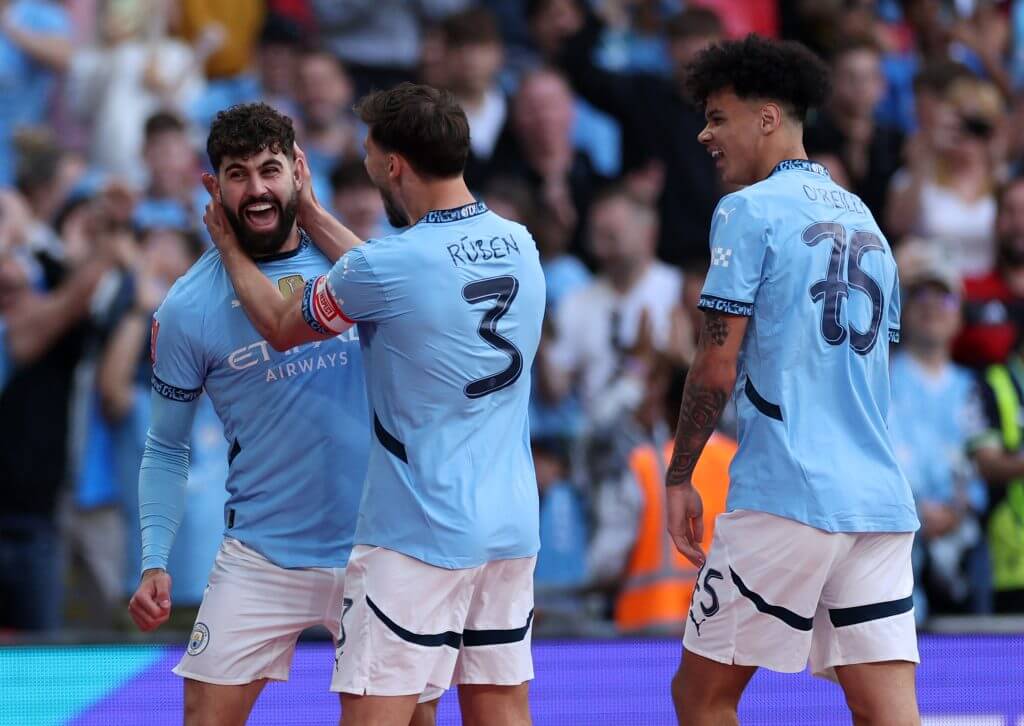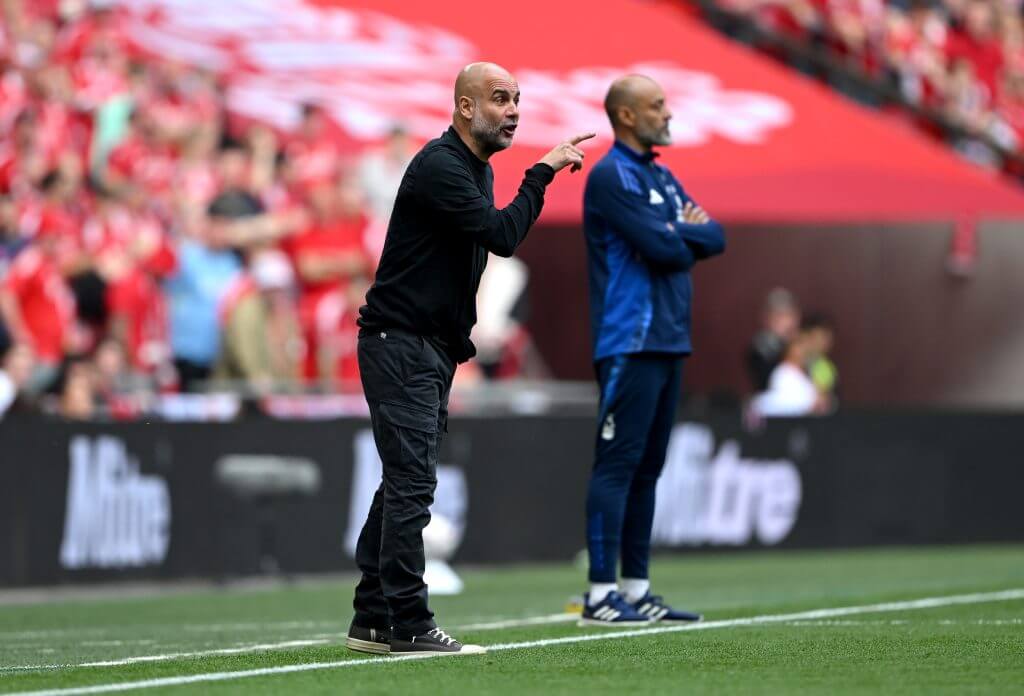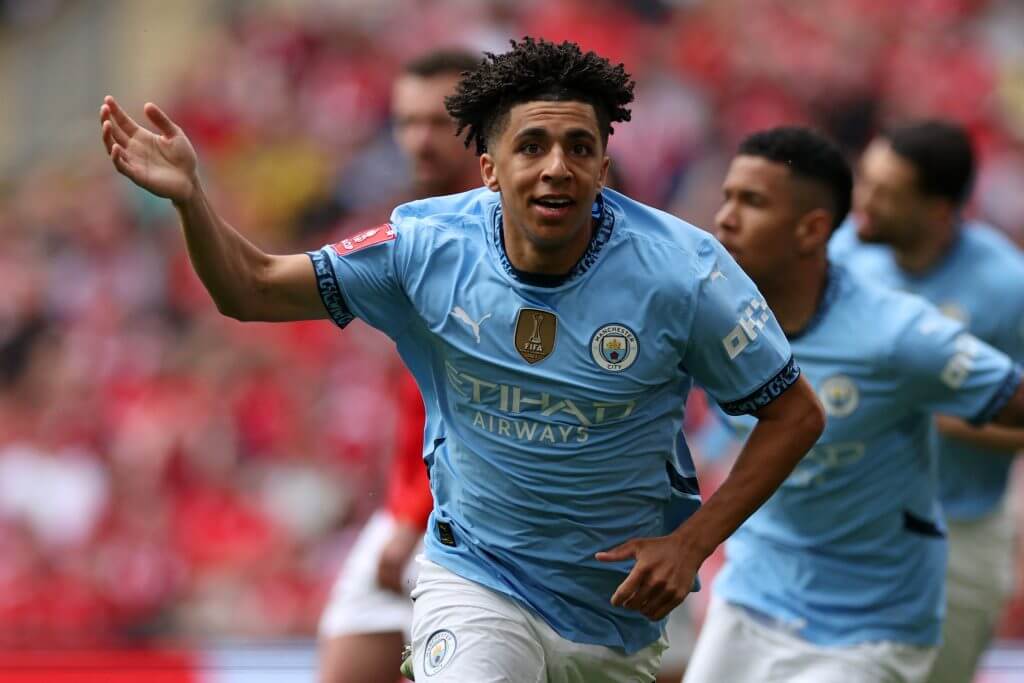
Manchester City reached the FA Cup final with a 2-0 win over Nottingham Forest on Sunday.
It was a nightmare start for Nottingham Forest as Rico Lewis gave Manchester City the lead after two minutes. Forest looked overwhelmed by the occasion in the opening part of the first half, but improved as the game went on.
Advertisement
Changes from Nuno Espirito Santo helped Forest improve after the break, but Josko Gvardiol doubled City’s lead in the 51st minute. Forest would go on to hit the woodwork three times, twice through Morgan Gibbs-White, but ultimately fell to defeat at Wembley Stadium.
The Athletic’s experts Sam Lee, Paul Taylor, Phil Hay and Thom Harris have analysed the key talking points from Sunday’s game below.
Are City getting back to their best?
There can be no doubt that City are edging closer and closer back to their best, and it may well be that they do finish this extremely disappointing season with a Champions League finish and the FA Cup.
They seem to be improving game on game, and their first 15 minutes here was probably the best football they have played for six months — they controlled the ball in the Forest half as my colleague Thom Harris outlines below, and they looked all the better for their experience, as Phil Hay writes.
Even for the rest of the first half, they limited Forest to barely any threat whatsoever. The ironic thing is that, just as they looked to be marching to another date at Wembley thanks to Gvardiol’s header, City started to fall apart somewhat. Forest hit the woodwork three times and Elanga put another good effort over that was eventually pulled back for offside, but that sense of danger that was never there in the first half was very, very real.
It was as if, far from being in control and benefitting from their experience, they got sloppy having got a two-goal lead, and from there they really struggled to wrestle control of the game again. The amount of individual mistakes was remarkable.
City had their moments in front of goal too, but the way the game ended will be a reminder that, for all that they have improved and as much as they can be confident that they will be even better by the time they play Crystal Palace, there is still a bit to work on.
Sam Lee

City have set up another date at Wembley Stadium (Adrian Dennis/AFP via Getty Images)
Did Nuno get his team selection wrong?
Nuno Espirito Santo’s team selection was heavily influenced by injury and suspension, with Ola Aina, Neco Williams and Eric Moreira all unavailable in the full-back positions. It meant Forest had a makeshift back four, with 18-year-old Zach Abbott making his second start for Forest out of position at right back.
Advertisement
But it was further up the pitch where Forest were ineffective in the first half, with Morgan Gibbs-White and Elliot Anderson struggling to make an impact in the wide positions within a 4-4-2. Callum Hudson-Odoi and Chris Wood were almost entirely isolated up front.
It was a formation that badly limited the impact of some of Forest’s most influential players, during a first half in which they had looked shellshocked following the early goal.
Forest immediately looked better when Anthony Elanga was introduced at half time, which allowed Anderson and Gibbs-White to return to more familiar central roles, within a 4-1-4-1. Elanga almost scored with one of his first touches, after being set up by Hudson-Odoi.
Nuno has got far more right than wrong, during a remarkable season in which he has transformed Forest from relegation battlers into a team challenging for a Champions League place. And Forest were significantly improved after the change, with Gibbs-White rattling the bar with a spectacular effort, before then being denied by the post. Taiwo Awoniyi also hit the post.
But this was a rare occasion when Forest’s tactical approach initially put them on the back foot and allowed City to take control of the game.
Paul Taylor

Forest lined up in an unfamiliar shape to start the game (Alex Pantling/Getty Images)
Was City’s big game experience a crucial factor?
Which of these clubs are more accustomed to an occasion like today’s?
To the uninitiated, exhibit A — the crowd — told that story: Forest’s end packed, City’s punctuated with unsold seats (a product of a Sunday afternoon kick-off in London, the cost of following City’s heavier schedule and, perhaps, the fact that domestic cup semi-finals have no novelty value for them).
There was energy from Forest following, far more than City’s before kick-off. But exhibit B in contrasting the experience of the sides was what happened once the whistle blew. City settled on familiar turf and scored inside two minutes. Forest froze in the cavernous Wembley surroundings and contributed nothing to the first half.
Advertisement
Danilo’s hand-on-hips pose at the break for half-time said it all, as did Anthony Elanga’s appearance off the bench for the second half. Elanga’s point-blank chance inside 60 seconds was curtains, a miss Forest couldn’t remotely afford; score that, or forever hold your peace.
This season might have rattled City, but know-how doesn’t vanish overnight. They’ve been dealing with high-stakes fixtures for years, their staple diet on Pep Guardiola’s watch, and Forest allowed them to cruise through the motions for too long. All Forest can hope is that a chastening afternoon provides a lesson for their next visit here.
Phil Hay

Guardiola’s side have more experience of big days like these (Shaun Botterill/Getty Images)
How important was City’s fast start?
It may be cliche, but a rasping finish from Rico Lewis after just 109 seconds was precisely what City needed to quieten down a rowdy Forest crowd, giving them a platform on which to brutally wrestle the occasion their way.
Nuno Espirito Santo’s side aren’t used to being behind so early — they have only conceded five goals within the opening 10 minutes of games this season, and are the Premier League side to have fallen behind in the fewest of their games. Within two minutes, most of the gameplan — sit deep, frustrate City, and hit quickly on the counter — was out the window.
Forest had just 11.4 per cent of the ball in the opening 10 minutes, and were scythed open time and time again by City’s slick passing game. A midfield four was stretched across the pitch by the high-and-wide positioning of full-backs Matheus Nunes and Nico O’Reilly, while Danilo — substituted at half-time — could not keep track of the relentless movement of Lewis.
Pep Guardiola is rarely so adventurous in his team’s build-up shape, but their one-goal cushion allowed them to be, picking apart a team who had no choice but to step out of their comfort zone and try to push up the pitch. It helped that his side were particularly dominant in their defensive duels too, with Ruben Dias especially effective at snuffing out hints of a counter-attack and dealing with them at source — a theme that largely continued throughout the first half.
Advertisement
Not many sides have beaten Forest this year but this was the blueprint on how to do it; score first, drag them out of their shape, and see the pressure and technical quality — and after the hour mark, good fortune — tell.
Thom Harris

Lewis celebrates his early goal for City (Adrian Dennis/AFP via Getty Images)
What did Nuno say?
We will bring you this after he has spoken at the post-match press conference.
What did Guardiola say?
We will bring you this after he has spoken at the post-match press conference.
What next for Forest?
Thursday, May 1: Brentford (Home), Premier League, 7.30pm UK, 2.30pm ET
What next for City?
Friday, May 2: Wolves (Home), Premier League, 8pm UK, 3pm ET
(Top photo: Shaun Botterill/Getty Images)
This news was originally published on this post .








Be the first to leave a comment